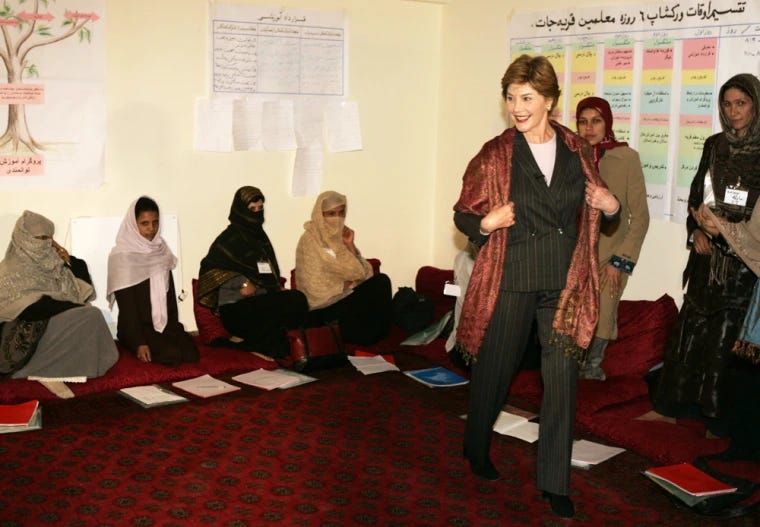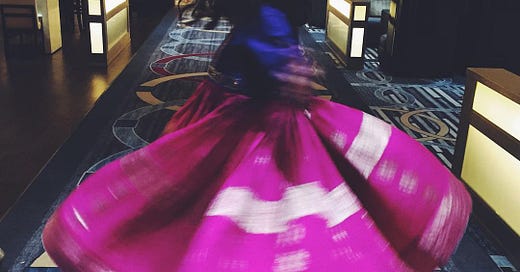What is “tabsera”?
When I was a young girl, I went to a lot of weddings. Uncles, aunts, cousins, family friends. There was always a new union to celebrate. In my first years of life, I would run around the banquet hall until I tired myself out. My parents would find me curled up somewhere sleeping at the end of the night and carry me to the car to drive home after a night of dancing. As I grew older, I knew to stay awake for these car rides back and to make sure I was in the car with my mom and her sisters. Suddenly, their composed, artificial facial expressions loosened up and their laughs became throaty. This was the “tabsera time” as I liked to call it.
In Dari, “tabsera” means quite literally “comment” and can be used in noun or verb form. It is used in a variety of contexts - religious, political, social, and colloquially as gossip. In the car ride back home with my mom, her sisters, and my grandmother, I would grasp onto every word they uttered about so and so’s dress and how so and so danced. At one moment, they laugh hysterically at a salacious comment my grandmother makes as her scarf slips off her gray hair. At another, they solemnly discuss a story they heard about a sick relative. However, in all these moments they are free. Free to feel however they want and to say whatever comes to their minds no matter how indecent or unbecoming it might seem.
Upon reaching high school and college, I began to judge and censor these moments. I criticized them for talking about other people behind their backs and assumed a superiority over them and their inferior “tabsera.” However, what I forgot was the transgressive, rebellious, and communal nature of these moments. The joy and awe of my younger self upon witnessing the matriarchs in my life disrobing the oppressive societal demands thrust upon them. I heard their opinions, beliefs, and impressions unfiltered and raw. To this day, whenever I speak with my grandmothers, I begin with the oft-used invitation to do “tabsera” among Afghans: “chee gap-ahst?” meaning literally “what is the talk?” or “what is happening?”
While this publication is not a gossip column about specific people and their lives, it follows in the long tradition of Afghan women like the ones in my family transgressing the roles they must play through communal “tabsera” or commentary. Because I am also a trained literary critic and theorist, the subject of my “tabsera” will be Afghan art, literature, film, culture, politics, and history. But a communal ethic will guide and help shape this publication as it evolves into what it is meant to be.
What I am doing:
Decades of war have turned Afghanistan into an orphan. Historical and cultural artifacts have been looted, intellectuals and political leaders assassinated, and the region’s history appropriated. Colonial and regional powers have taken advantage of this void to impose their own narratives fueled by their political interests and ambitions. Afghans have become synonymous with the terms, barbarians, terrorists, uncivilized, and radicals, in the global imaginary.
Post 9/11, the burqa-clad Afghan woman, specifically, turned into an empty space where anyone can insert their fears, fetishes, ambitions, desires, and guilt. In November 2001 while bombs were being dropped on Afghan soil, Laura Bush addressed the nation and claimed that “the fight against terrorism is also a fight for the rights and dignity of women” (White House Archives). The war on terror in Afghanistan suddenly assumed another purpose - to liberate the oppressed Afghan woman. As the war went on with no end in sight, she then became a site in which Americans could pour their guilt for starting an endless war. If we can just liberate the women, maybe the war was not meaningless.
The woman behind the blue burqa also became a fetish. Unveiling this woman turned into a Western feminist sacrament with the Afghan woman acting as the sacrifice. This practice had already been established before the war began. In New York City on February 10, 2001, Oprah Winfrey lifted the burqa off an abused Afghan woman in front of thousands at Madison Square Garden for a gala benefit of The Vagina Monologues.

The war ensured that the Afghan woman’s story and narrative was tightly controlled and produced for political purposes. In a leaked CIA Red Cell Special memorandum from March 2011, the U.S., anxious about the Dutch pulling its troops from Afghanistan and the apathy building about America’s longest war, underlined the importance of Afghan women as messengers for the war’s continued relevance:
Afghan women could serve as ideal messengers in humanizing the ISAF [International Security Assistance Force] role in combating the Taliban because of women’s ability to speak personally and credibly about their experiences under the Taliban, their aspirations for the future, and their fears of a Taliban victory. Outreach initiatives that create media opportunities for Afghan women to share their stories with French, German, and other European women could help to overcome pervasive skepticism among women in Western Europe toward the ISAF mission.
CIA Red Cell Special Memorandum, March 11, 2010, quoted in Stories and Statecraft: Afghan Women’s Narratives and the Construction of Western Freedoms by Sujatha Fernandes
Afghan women were essentially used as a vehicle to humanize the mission of the war, the foreign forces involved, and the Western world, in general. Never was the humanization of the woman herself as a distinct being considered.
While this publication will not be focused on Afghan women, I use this as an example of the intentional dehumanization of all Afghans. One strand of this dehumanization took root in the aftermath of 9/11 when any attempt to understand why the events happened led to accusations of being a terrorist sympathizer. It seemed as if the history of the U.S.’s involvement in the region began on September 11, 2001 and any attempt to understand the before was dishonoring the lives lost on that day.
In Precarious Life: The Powers of Mourning and Justice, Judith Butler recounts this post-911 experience of censorship:
There is no relevant prehistory to the events of September Il, since to begin to tell the story a different way, to ask how things came to this, is already to complicate the question of agency which, no doubt, leads to the fear of moral equivocation. In order to condemn these acts as inexcusable, absolutely wrong, in order to sustain the affective structure in which we are, on the one hand, victimized and, on the other, engaged in a righteous cause of rooting out terror, we have to begin the story with the experience of violence we suffered. (Butler 6)
I think in many ways this denial of an Afghan history contributed to the dissociation many Afghan-Americans have felt from their culture and country. I hope “Tabsera” becomes a space where Afghans can finally question history, look at context, and delve into complex ideas without the fears associated with a post 9/11 world.
Who I am:
I am a part of the Afghan diaspora. Born and raised in America in the 90s to Afghan parents who were born and raised in Kabul in the 60s. They were eventually displaced as a result of the Soviet invasion of Afghanistan in 1979. In many ways, this Substack is my attempt to reclaim my whole self that I have had to compartmentalize throughout my life into neat little parts.
Afghanistan is a part of my story whether I accept it or not and I have decided to do the former. I do not believe the narratives that have been packaged and marketed to us because they try to create generalizations. Instead I have come to realize that my story and all of our individual stories are the narratives we have been searching for. There is no representative Afghan woman and I don’t aim to be that.
I am remiss to not mention that this whole project is a result of live-action “tabsera.” I have recently met someone who is now a dear friend and intellectual confidante, Sola Mahfouz. I attended the Boston Book Festival on a whim last year and saw her on a panel titled, “Women Scientists: Breaking Through.” Inspired by her story (and also needing more friends close by), I approached her after the talk and mentioned how much I enjoyed it before quickly scurrying off without asking for her number. Thanks to social media, we met up for coffee shortly after and since then we have become each others’ bouncing boards for all our ideas and theories about the world. I read her book, Defiant Dreams, after I met her, and I cannot recommend it enough.
Our lives could not be more dissimilar. Sola, a girl who grew up in Kandahar during the war on terror years, was not able to attend school. In many ways, she embodies the type of girl my mom would mention whenever I would complain about going to school growing up. However, our minds, our viewpoints, our insatiable curiosity could not be more similar. We both challenge each other in different ways and Sola’s courage and persistence to be heard motivated me to finally publish my writing. I hope through this process I am able to meet more Sola’s and hopefully be a Sola for someone else.





What an introduction! So much could be said about everything you said here. I thought tabsera was going to be something Arabic. My immediate thought went to the Quranic verse
تبصرة و ذكرى لكل عبد منيب 50:8
But it turned out to be a Dari word! I'm sure you can find the etymological connection between the Dari and Arabic words. If in Dari it means comments, and in Arabic it means insight, then the tabsera your family engaged in offered cultural and social insight to you as a young girl, and this blog by extention offers the readers similar insights through your comments on Afghan culture.
What you said about the censorship of talking about what lead to 9/11 is exactly the same thing happening with Oct 7. The cycle repeats.
And what a serendipitous meeting of you too. I love it when friendships occur like this, almost accidentaly. I had a similar experience in the subway recently where I met an Urdu poet. We haven't become tight friends but it was still a very cool encounter.
Excited to read more!
Absolutely brilliant. The generational kaleidoscope....